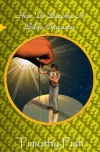
And Thy House
Extra Feature: High Res Image

History of
Cane Creek
Association
by D. F. Magruder
How to Get Published
Written By: Timothy Fish Published: 5/11/2007
Imagine this scenario. You have just completed your masterpiece, a novel about vampire cheerleaders in outer space. You want the whole world to read your work. Now all you have to do is find someone to publish this great work of yours and you are on your way to the easy life. After sending your manuscript to many different people in the publishing industry, you find that no one is willing to publish it. You start to wonder, “What is wrong with these people? They are publishers; they are supposed to publish.” I do not know that all unpublished authors have this view of the publishing industry, but in reading various websites that were created by authors who are frustrated after receiving many rejection letters that is the impression I have gotten.
The Author’s View of Publishing
The author of a book starts with an idea. It could be anything, such as the vampire cheerleaders in outer space idea that I mentioned before. For some reason, the author gets it in his head to spend days, weeks or even years converting this idea into a book. He eats, sleeps and breaths this thing for quite a while. Eventually, the book is finished and the next step is to get his baby into print, so the royalties can start rolling in. To the author, the publisher is just a guy who provides a service. As far as the author is concerned, that service is only to publish his book.
The Publisher’s View of Publishing
The publisher is a businessperson. His primary concern is putting food on his table. If that table happens to be in a mansion then so much the better, but to make any of it happen, he has to make a profit. A publisher’s profit comes from book sales. In the traditional publishing model, a publisher is offering a service, but it is not to the author. The publisher provides books to book sellers. Booksellers, who also want to put food on their tables, are also interested in a profit. That means that they want books that their customers will buy. If a bookseller only has customers who want mysteries then he is going to go to the publishers and ask for mystery books. He will not be going to a publisher and asking for romance, science fiction, or self-help books. The publisher may have books in some genres that are much better written than any thing he has in the mystery genre, but that does not matter. The customers want mysteries so that is what they will get.
If the bookseller is telling the publisher that he wants mystery books then the publisher is going to focus his attention on publishing mysteries. If the only thing the publisher is able to sell are mysteries then it will reach the point that when reading through the slush pile, the editors will reject anything that isn’t a mystery. In the slush pile could be the best self-help book ever written. One that is so well written that if all people would apply it to their lives it could bring world peace (Ok, one of those has already been written, but that isn’t the point.), but because no one wants to buy it the publisher will reject it.
The Publisher-Author Interaction
The relationship between the author and the publisher is an interesting relationship. It is interesting because the author thinks the publisher is providing the author with a service and the publisher knows that the author is providing him with a service. Generally, publishers do not write books. A publisher’s expertise is publishing books. Because he needs words to go in his books, a publisher goes out in search a manuscript. They are not hard to find. There are thousands of them. The publisher sorts through these thousands of manuscripts until he finds one that he thinks has a good chance of selling. If mysteries are in demand then it will be a mystery. The publisher spends some amount of money on preparing the manuscript for printing and then informs people that it is available. Most likely, the book will not even make profit, but it is a calculated risk that is offset by those that do.
The author’s responsibility in this relationship is to create the manuscript. You might think of it as food court at a mall. The publisher is a patron at the mall. He has gotten hungry, so he goes in search of food (the manuscript). He only needs one. He may be able to afford more, but like a food court, where we do not eat more than we think we need; the publisher will only acquire as many manuscripts as it takes to meet his need. A patron at a food court might have ten choices for food, but a publisher has thousands of choices. At a food court, once a patron makes his choice, the other nine stores are left hoping that another customer will come along. Authors are in the same position with their manuscripts.
What It Means to the Author
Too often, authors write something that the author wants to write and then gets upset when a publisher does not want it. An author might write his life story. An author might write a book on a subject that that is not selling now. An author might write a book on subject that people will not read, such as the one on vampire cheerleaders in outer space. Well, someone might read it, but do not expect it to be the next Harry Potter.
Some authors have described writing as something that they had to do. While listening to bestselling authors, we might get the impression that the road to success is to find something that is important to us and write about it with passion. What we miss in analyzing the success of authors is that there are many other authors who approached writing in the exact same way as these authors, who may be better writers, but failed to be published. The only real difference between those good authors who were published and those who were not is that the publisher looked at one manuscript and said, “I think this will sell” while he looked at the other and said, “No one will buy it.”
The question that authors who want to be successful need to be asking is what people want to read. There is something to be said for the skill of the author too, but it is hard for us to judge our own skill. We all assume that we are sufficiently skilled to write a book that will sell or we wouldn’t try it. So since we have the ability, just as the publisher focuses his attention on what the bookseller wants, we need to focus our attention on what the publisher wants.
What the Publisher Wants
What is it that the publisher wants? The simple answer is that he wants a book that will sell enough copies to bring in at least $10,000 to $20,000. That may be around 5000 copies of a fiction book. In non-fiction, it may be a simple as asking the publisher what he needs. I there is a new programming language for which there is no good reference manual, there is probably a publisher who is looking for an author to write the manual. In fiction, it isn’t as straight forward. The publisher really doesn’t know what will sell and what won’t. That is why only 30% of books make a profit. If the publisher really knew what people would buy, 100% would make a profit.
The author who wants to sell a manuscript to a major publisher needs to think more like the publisher and less like someone who is trying to get a point across. People do not buy books to find out about the pet peeve of the author. People buy books to be entertained, to learn and for reference. People don’t mind reading books with similar plots to books they have previously read, but they want it in a new light. Look at how many books there are that follow the Cinderella plot. Look at the how many books there are that follow the girl meets guy, girl loses guy, girl and guy make up theme. Some of us have bought books because they followed a well-known plot that we have enjoyed form other authors.
An author who wants a major publisher to pick up his manuscript needs to be aware of what is putting bread on the publisher’s table. For Bloomsbury Publishing, it is Harry Potter. It would be wrong to just copy the plot, the characters or the writing style, but author’s who want to succeed can look at the success of the series and realize that publishers are likely to be looking for books that allow people to escape from their boring, tiring, everyday lives into a world of fantasy. This is proven out when we consider some of the other books that have succeeded recently. Celebrity books seem to sell. That does not help us nobodies much. Diet books, self-help books and for some reason, books by atheists, seem to be selling at the moment. Authors who want to be noticed by publishers need to pick a subject or plot that is selling then write the very best book within that area that they can write that looks at it in a way that no one else has looked at it.
A Different View
I have read a few books more than once. When I was a kid, I would read a book, then go back, and read it again. Now, I do not do that. If I do read a book a second time, it will be quite a while after I read it the first time. If I really like the plot, I will read a book again, but what I would really like is another book that has a similar plot, but looks at the subject in a different way.
I remember reading a book when I was a kid that told the story through the eyes of one person in the first half of the book and then in the second half it told the exact same story, but it was through the eyes of another character. Even though I knew how the story would end, I enjoyed the second half because is was in a different point of view.
The job of an author is to give something that makes them think. People will read a book if it allows them to see something in a different light. Even if they conclude that he author is a complete idiot, as long as the can see things from a different point of view, the book has potential.
The Book That Has to be Written
Sometimes, the thing that motivates an author to write a book is a desire to get his point across to the world. Some of these books will sell, especially if people get the impression that the author knows what he is talking about and no one else as thought of it. Since some of these books will sell, publishers will buy some of these manuscripts and may even pay a high advance for a few, but if an author is telling people something that they don’t want to hear or that the publishers are morally opposed to, it is unlikely that the manuscript will sell.
When this is the case, the solution may be for the author to take the self-publishing route. There are now publishers who will print anything for as little as $99. Editing, etc. cost extra. For books that aren’t likely to hit the 5000 sales mark, this may be a good choice. So, if you do happen to have a book about vampire cheerleaders in outer space then you might want to use this option.
The reason that some publishers are willing to make books available this way is because they can guarantee a profit for every book sold. The author ends up taking the risk and the publisher doesn’t have to spend money looking for manuscripts that will sell enough books to recover the publisher’s investment.
Author as Publisher
Typically, the thing that distinguishes a publisher from a printer is the ISBN. The publisher owns the ISBN. While this is true, in situations where a company prints whatever the author sends it, the author is taking on all of the responsibility of publishing except for obtaining the ISBN. When this happens, making a distinction based on who owns the ISBN is splitting hairs. If the author pays editing, pays for setup fees, pays for cover design, etc. the author is doing the work of the publisher, so the author is the publisher. In the case where the author owns the ISBN, there is no doubt.
I make the point that the author is the publisher because when the author is assuming the risk and paying for everything, the author needs to think more like a publisher and less like an author. As an author, I would like to place my book, Church Website Design, in the hands of thousands of church leaders and church webmasters. I would do it free if I could afford it. I would love to be able to mail a copy to every church nation, but I cannot. If I look at it as a publisher, I would have to be more concerned about making a profit. If the cost of publishing the book can be kept to $99 then the break-even point is somewhere around 25 books. That is a lot better than 5000, but that requires the author to do all the work. If the author/publisher pays someone to do things like editing and promotion then the cost may go up to 500, 1000, 6000 dollars or even higher. The may mean that over a thousand copies of the book must be sold before a profit is realized.
A Publisher’s Criteria
The author as publisher needs to apply the same criteria to his manuscript that a traditional publisher does. The author as publisher does not go out searching for an author. Instead, he generates the manuscript that he needs. As he does so, he should question whether the book would sell once it is in print. He has an advantage over a publisher because he can reject his own manuscript before he even finishes it. If more authors would reject their own manuscripts before sending it off to publishers, the publisher would not have to reject it. We would see more well written books and a higher percentage of manuscripts would make it out of the slush pile.
There will always be a need for books that are printed even though no publisher is interested. The world will learn nothing if the only books available are those that they want to read. Some books should be printed as cheaply as possible do that they make a profit even though they have a small audience and some books should be printed at a loss because the content is worth far more than what people realize. But authors who wish to make money from their craft need to learn to be as selective of their own work as the publishers will be.
www.timothyfish.com



